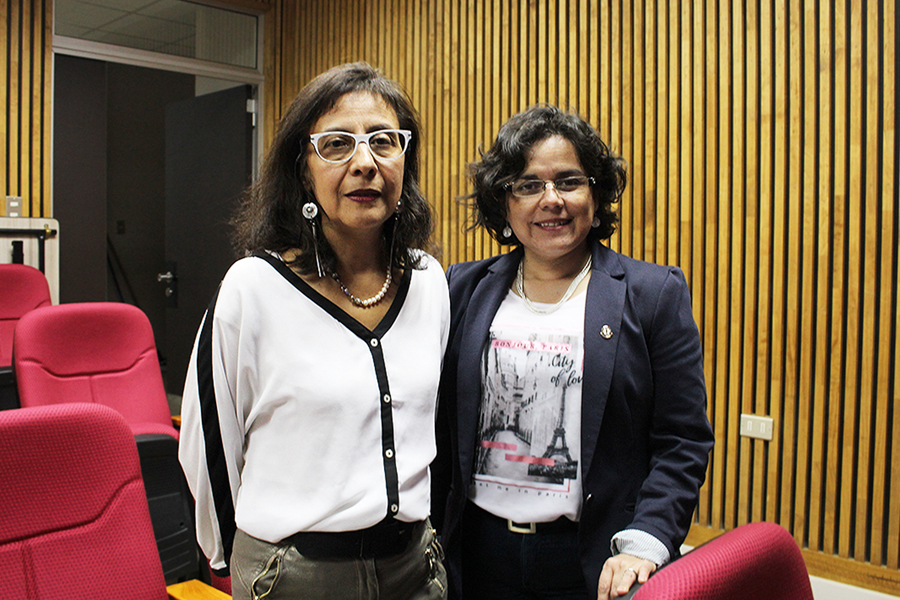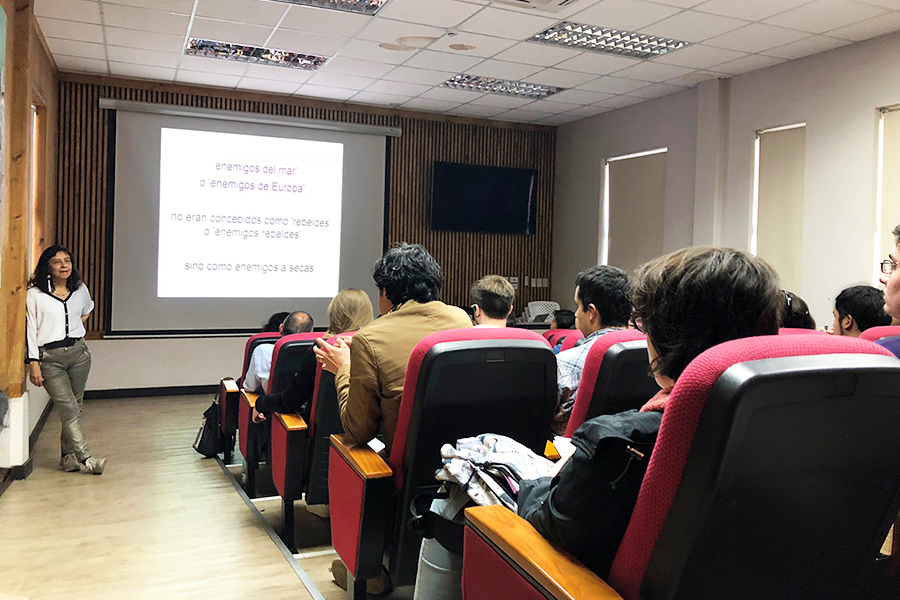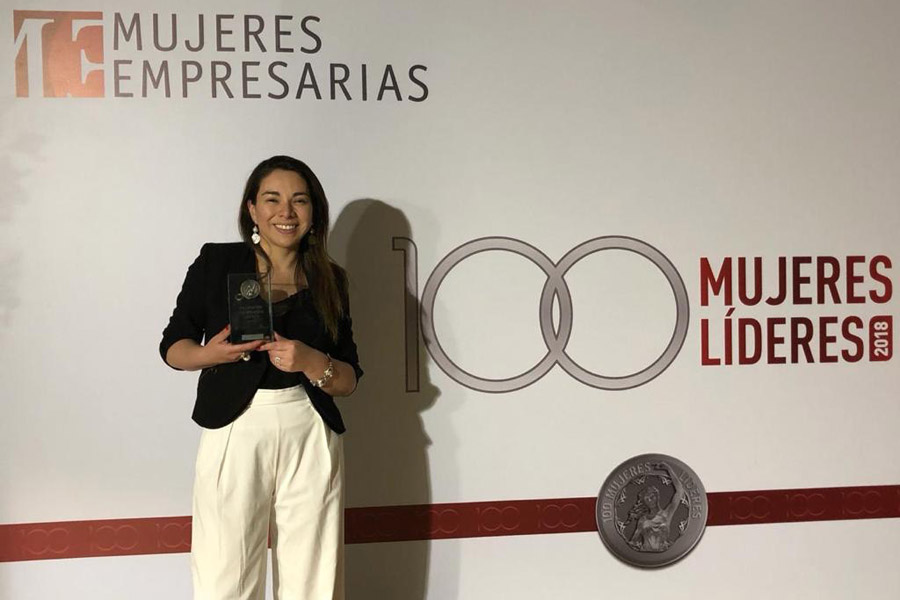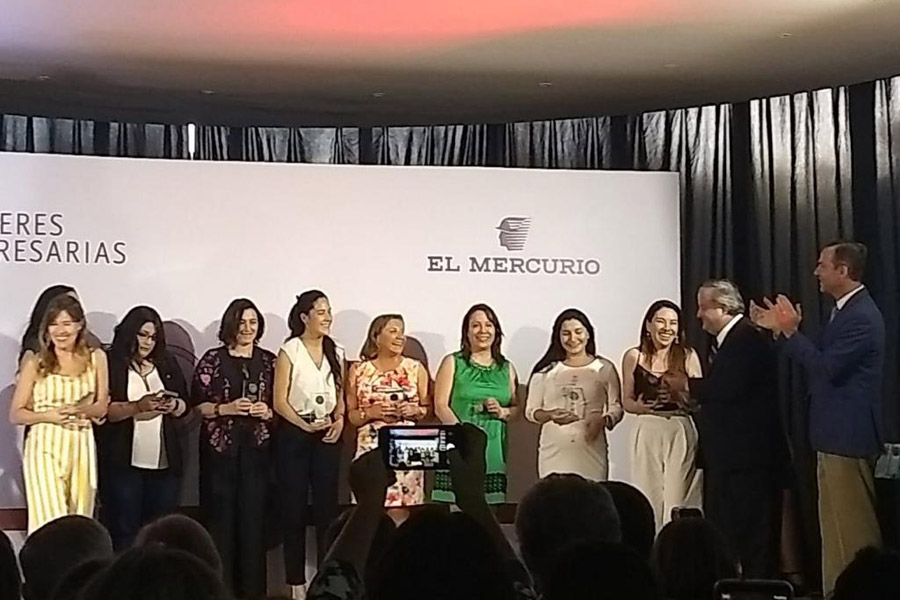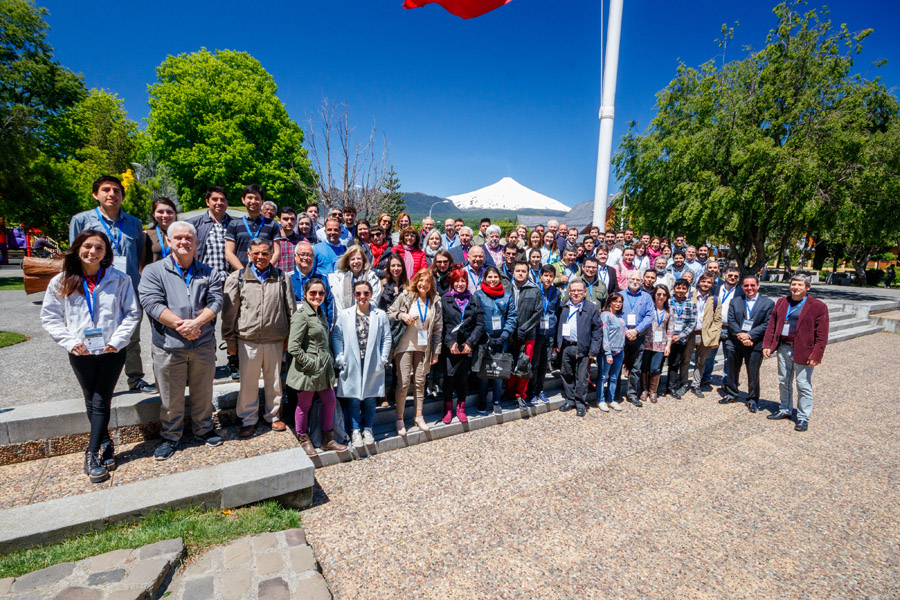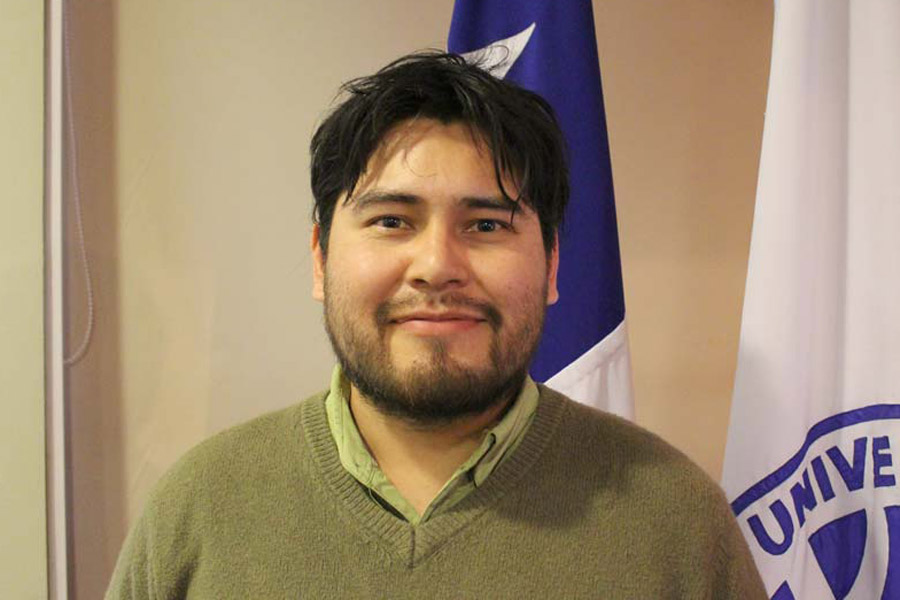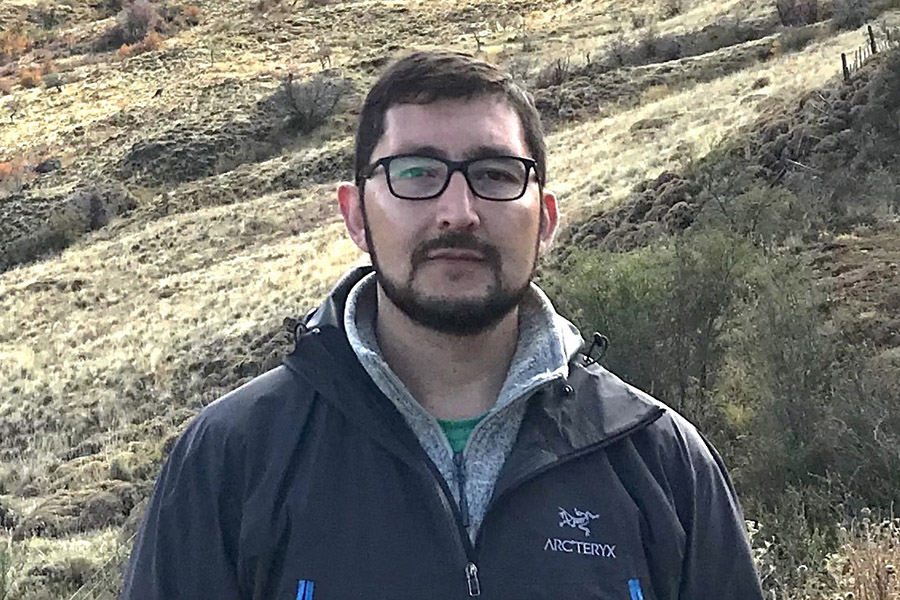|
Dr. Jimena Obregón visited the UFRO with two intentions: to participate in the 6th Cycle of Dialogue about History, and to strengthen the partnership between both universities |
Within the framework of permanent activities in the field of history, organized by the Department of Social Science at the Universidad de La Frontera, the 6th Cycle of Dialogue about History took place, addressing the issue “Power on the Margins, Frontier, People and Territories”. One of the participants was Jimena Obregón Iturra, an outstanding professor at the University of Rennes, France. She added that she studied that period of time, because it is a century she had not studied enough and pointed out: “It caught my attention because, when I started to work, this specific period of time was the one that had been studied the least and that had a lot of particularities, because it is a moment apart in itself, precisely because of the indigenous slavery that was legal in that epoch.” Yéssica González, academic at the Department of Social Science in the field of history, expressed her respect for the professor: “Professor Jimena spoke about the indigenous uprising in the 17th century, but the fundamental discussion is more profound and a question of methodology that has to do with the way we now deal with the implications that have to use certain analytical categories for the construction of historical knowledge about the region, certain episodes and phenomena.” “The interesting, the methodological, is that the academy started a discussion in the field of history and social science at the end. This has to do with rereading our research, rereading what we have been doing. We started to ask ourselves about the magnitude and the effect that has to use certain concepts or categories of language, take charge of the burden, no matter the redundancy of this discussion,” González added. History is a discipline that needs and lives with the help of others. In this regard, the professor Yessica Gónzalez pointed out: “It seems to me that, regarding the level of this discussion, a lot of other more interesting and, at the same time, more flexible and more open topics will come up; it is a way to advance with what interests us, the democratization of knowledge and the mainstreaming of this topic, because that necessarily forces you to think about how to work together.” VISIT WITH A DOUBLE PURPOSE Besides of her lecture, Dr. Jimena Obregón visited the UFRO with another purpose that has to do with the joint work between the University of Rennes and the Universidad de La Frontera: to strengthen the student exchange and the collaborative networks between these universities. “This is interesting and challenging for us, because it permits us to strengthen our networks, which is the aim we focused on lately and, on the other hand, to start thinking about how to promote this kind of exchange, especially for undergraduate and postgraduate students,” the academic added. “I am trying to organize exchanges under the name of this new institution I am working for, the University of Rennes,” Dr. Obregón explained, and added: “What I want to promote now are agreements at the postgraduate level. Everything that has to do with the internationalization of the students’ training, so we can give them the opportunity to get to see another world, to discover another educative system and to return with an expanded horizon.” ASSOCIATED PROJECTS Diufro project 2018 DI18-0058: Bad women. Violence, criminality and justice practices at the margins. Concepción (Chile) in the 19th century. Diufro project 2018 DI18-0049: History of the Southern Cone revolutionary left in the 60th and 70th from a cultural perspective. Project: I+DHAR 2012-37394-MINECO (Chilean Ministry of Economy and Business).
 Written by: Claudia Palacios Written by: Claudia PalaciosFaculty of Education, Social Science and Humanities |
|
The fifth National Congress of Nanotechnology took place from November 25 to 29, and brought more than 200 scientists from Chile and important international guests together. One of the participants was Dr. Eduardo Cisternas, a researcher and the director of the Department of Physical Sciences at the Universidad de La Frontera and a member of the Millennial Nucleus for Nanotechnology (MultiMat), one of the organizers of this event. |
From this year on, the tourist capital in the south of Chile will not only be remembered because of the holidaymakers and sportsmen and women. Science was also present at the frontier, in the form of one of the most massive events in the past years: the 5th National Congress of Nanotechnology. This event was organized by several institutions, among which the Universidad Austral de Chile, Universidad de Chile, Pontificia Universidad Católica de Chile and the Millennial Nucleus for Nanotechnology (MultiMat), represented by the academic at the Department of Physics of the Faculty of Physical Science and Mathematics of the Universidad de Chile, Marco Flores, who pointed out that “this is a spectacular place, not only because of its natural beauty, but also because of its excellent infrastructure for this kind of events”, were standing out. NANOTECHONOLOGY, A LITTLE SCIENCE FOR GREAT SOLUTIONS “Nanotechnology studies the small things. In this universe, which is still quite unexplored but fascinating, we can find answers, for example, to problems of energy transformation and storage, electronics and even health,” Dr. Marcos Flores explained. During the event that took place at the Enjoy Hotel in Pucón, Chile, the scientists were presenting their research advances in different areas, such as: treatments for Alzheimer, water desalination processes, graphene-derived insulators, the formation of crystal liquids and the advantages of lithium batteries, among others. “This congress invites the whole national scientific community to analyze the frontier of knowledge in that field and, this time, we wanted to add a key mark… the link between science and the industry. We want that the solutions come out of the laboratory and improve people´s lives dramatically,” explained Judit Lisoni, director of the Millennial Nucleus for Nanotechnology and full professor at the Institute of Physical Sciences and Mathematics of the Faculty of Sciences of the Universidad Austral. REGIONAL IMPACT For the professor Eduardo Cisternas, academic at the Department of Physical Sciences of the Universidad de La Frontera and an expert in computer simulations and supercomputers, this initiative was extremely important. “The fact that this congress takes place outside of Santiago shows that things are changing in the right direction - the knowledge is distributed throughout the whole country,” Dr. Cisternas explained. “We hope that, in the short and medium term, the level of maturity of our scientific community reaches to conquer the industries. We are conscientious that this part of knowledge has its origin at the universities and it is our interest to transfer this technology and knowledge, and to file the respective patents,” Dr. Flores concluded. ABOUT MULTIMAT The Millennial Nucleus for Multifunctional Materials for Applied Surface Science, MultiMat, is a multidisciplinary group financed by the Scientific Millennial Initiative. Its aim is to develop advanced nanotechnology in Chile, with an emphasis on the field of lithium-ion batteries. Source: Chilean Millennial Nucleus for Nanotechnology, MultiMat
|
|
The Businesswomen Foundation and the newspaper El Mercurio acknowledged the contribution of Valentina Villa Urra, creator of a technological tools startup for educational processes, which has been supported by the business incubator of the UFRO. |
On November 27, the Businesswomen Foundation, the newspaper El Mercurio and the TV station TVN published the names of the “100 leading women in Chile” in order to acknowledge the contribution and leadership of businesswomen, executives, authorities, artists, academics, entrepreneurs, philanthropists, sportswomen and social examples from all over Chile, who have been chosen by a jury out of over 600 candidates. On this occasion, the jury, which was made up of ministers and outstanding businessmen and women, acknowledged Valentina Villa Urra, an entrepreneur supported by the business incubator Incubatec of the Universidad de La Frontera and founder of the platform AEDUC, which sells technological solutions for the improvement of educational processes in educational establishments in the Araucanía Region and other regions through a test simulation software and data that favors the teaching process for directors, directors of Pedagogical Technical Units and teachers. “I feel honored that the progress and accomplishments I achieved as a female entrepreneur, especially in the Araucanía Region where we started our visionary work seven years ago with Incubatec-UFRO, and the fact that I am one of just a hand full of women who are leading technological projects at the national level, have been acknowledged. Now, our challenge is to keep innovating, with new tools we will put on the market in order to complement the assessment system, in order to keep offering solutions for the improvement of the education of our clients,” said the educational psychologist Valentina Villa, who participated in the award ceremony that was chaired by Cecilia Morel, the First Lady of the Republic. Incubatec-UFRO emphasized the acknowledgement of the entrepreneur who reached out to the business incubator quite some time ago to ask for advice regarding her business idea, and who now has a long list of clients with about 80 educational establishments in the country. She built her business with capital that has been co-financed by the UFRO and CORFO. It is worth mentioning that the business incubator of the UFRO has been acknowledged by CORFO for three years in a row now, for having the portfolio with the highest private capital and sales in the country. Incubatec also was in eighth place in the category World Top Business Accelerator Linked to University in the worldwide ranking of the World Incubation Summit of UBI Global in Toronto and in first place at the Latin-American level. Written by: Communications Office
|
|
The XVI Latin-American Conference of Analysis by X-ray Techniques (SARX 2018) and the VI. Conference on Medical Physics at La Frontera (JFMF 2018) were the two events that took place simultaneously and brought hundreds of researchers, teachers and undergraduate and postgraduate students from Chile and other countries together in the Araucanía Region. |
“Science starts with actions”. With this in mind, Dr. Rodolfo Figueroa, researcher at the Department of Physical Sciences of the Universidad de La Frontera, assumed the challenge of organizing and developing two parallel international events for the dissemination of science regarding x-ray techniques and medical physics. The XVI. Latin-American Conference of Analysis by X-ray Techniques (SARX 2018) and the VI. Conference on Medical Physics at La Frontera (JFMF 2018) were the two events that took place simultaneously and brought hundreds of researchers, teachers and undergraduate and postgraduate students from Chile and other countries together in the Araucanía Region. From November 6 to 9, the Pucón Campus of the UFRO was the headquarter of both events where they presented different contributions to the development and use of x-ray techniques in different industries and fields, such as mining and medicine, apart from other issues linked to medical physics. “Both congresses are related in some way. This is why we wanted to do them in parallel, in order to create links and the exchange of experiences between the participants and, on this occasion, with a main focus on medical physics,” Dr. Rodolfo Figueroa pointed out and added that the closing ceremony of both events was held on November 7, a date that has not been chosen randomly, since it is the International Day of Medical Physics. The structure of both events was similar, with conferences, oral presentations and poster presentations, among other activities oriented towards the update of knowledge and exchange of experiences between the participants. “The field of medical physics is relatively small compared to the other areas of physics or medicine and, although it has been existing for a lot of years, it is not quite known by the general public and even by a lot of professionals in the medical field, unless they have had the opportunity to interact or collaborate with medical physicists,” he explained. In this regard, he added: “These events are extremely important in order to help each other, especially in countries with low resources, where the profession is being developed through education as well as technical applications, scientific development and the development of applications,” Dr. Yakov Pipman, member of the American Association of Physicists in Medicine, confirmed. Dr. Ignacio Queralt of the Spanish National Research Council was also present in Pucón and said: “The interaction between scientific fields always requires progress in our knowledge, and synergistic activities between different disciplines always help. It is important that the level of education and research go hand in hand with the young professionals, and events like this one help us to fulfill this purpose.” It is worth stressing that within this strategy of promoting the early interest and training of specialists in applications of x-rays by bringing together experts and students, the International Centre for Diffraction Data (ICDD) supported the participation of students from different countries by providing 12 scholarships that covered the accommodation, as well as the Vice-rectorate for Academic Affairs of the UFRO, which provided 10 undergraduate students with scholarships that covered the inscription fee, and the Master´s Program in Medical Physics of the UFRO, which provided a similar benefit to its students. E-POSTERS One of the traditions at this kind of events is that different groups of the participants present a part of their research or the results in the form of a scientific poster. Instead of the traditional presentation of these posters, the organizing committee introduced an innovation by making use of technology in order to present each poster. This is why, on this occasion, the poster presentation gained special attention. The e-posters have been presented on four 55 inch screens that have been mounted in a vertical position on 1.20m high pedestals that have been especially made for this occasion and will be available for similar events at the university in the future. Written by: Daphne Bormann
Faculty of Engineering and Science |
|
To study, analyze and even predict landslides in the Center-South area of Chile are some of the aims of this new alliance of the Universidad de La Frontera. What happened in Villa Santa Lucía and Petrohué will be a reference for the study. The investment exceeds 630 thousand USD and the project will take 4 years. |
The Andes and the Himalayas will be under the same spotlight. And although both mountain ranges are separated by thousands of kilometers, both have something in common regarding their behavior, what alarms the group of UFRO researchers and the Institute of Mountain Hazards and Environment of the Chinese Academy of Sciences in China. It is an unprecedented alliance between the Faculty of Agricultural and Forestry Science and the Faculty of Engineering and Science, represented by Dr. Marcelo Somos and Dr. Ivo Fustos, together with Chen Ningsheng of IMHE and CAS, who are preparing themselves for the beginning of an ambitious research project with the objective of improving the art of prevention of and adaption to natural disasters. The project includes the study of cascade effects, incidents in the past, the understanding of mechanisms that lead to danger, and the proposal of new methodologies and technologies in order to improve the resilience and adaptability. In simpler terms, they will carefully examine the landslides occurred in nearby areas of the Andes and the Himalayas. But what do these two massifs have that could be interesting for the researchers? The answer comes from Dr. Fustos: “The landslides in both massifs are caused by subduction processes, which is when the oceanic plate sinks and slips under another continental plate. That’s when, although the angle of subduction in the Himalayas is lower compared to the Andes, both of them register landslides.” This is exactly what the scientists want to find out. Why does it happen, how often, which is the massifs’ history and, above all, how to predict an event like that in order to prevent, especially in the nearby villages and towns. “We are going to compare the areas in China and Chile, where landslides with similar characteristics have happened in the past, in order to understand the mechanisms that are causing this kind of events,” Dr. Somos explained. In December 2017, the village Santa Lucía of the commune Chaitén in the Los Lagos region was surprised and swept away by a flood caused by landslides, while three weeks after that another event like this occurred in the same region and swept away the road between Ensenada and Petrohué. Both incidents are references that will be compared, for example, to what happened in the area of Yigong in April 2000, when a rockslide travelled eight kilometers downstream in just ten minutes. “This is a comparative study with which we aspire to find new ways of monitoring and new knowledge to decipher these happenings, and to understand the main control factors. We will also generate methodologies that will allow a future joint cooperation in the search for funding for the implementation of solutions,” the researchers concluded.  Written by: the Rector’s Office Written by: the Rector’s Office |





